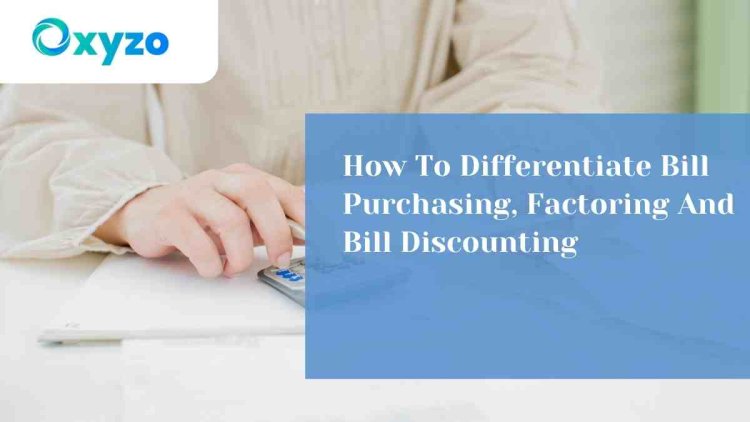How To Differentiate Bill Purchasing, Factoring And Bill Discounting
For businesses looking for quick access to working capital, bill discounting offered by new-age fintech companies like Oxyzo may be the best option
Share this Post to earn Money ( Upto ₹100 per 1000 Views )

Bill discounting, bill purchasing, and factoring are financing solutions that financial institutions offer businesses to manage their cash-flows and provide access to working capital. While these terms are often used interchangeably, they have some differences that are important to understand.
What is Bill Discounting?
Bill discounting in financial services refers to a financial technique where a business sells its outstanding invoices (receivables) to an NBFC at a discount in exchange for immediate cash. The NBFC takes over the role of collecting the payments from the customers, while the business gets a portion of the invoice amount in advance. This type of financing is commonly used by businesses that need short-term cash to manage their daily operations.
What is Bill Purchasing?
Bill purchasing is similar to bill discounting, but in this case, the NBFC or any financial institution buys the outstanding invoices from the business outright, for a price that is less than the full face value of the invoices. The financial institution then takes over the responsibility of collecting the payments from the customers and is entitled to the full face value of the invoices.
What is Factoring?
Factoring is a type of financing in which a business sells its accounts receivable (outstanding invoices) to a financial institution (factor) for a fee. The factor advances the business a portion of the invoice amount, typically 80-90%, and assumes the responsibility for collecting payment from the customer. Once the customer pays the invoice, the factor deducts their fee and remits the balance to the business. Factoring is often used by businesses that need quick access to cash and do not have the time or resources to wait for customers to pay their invoices.
Bill Purchasing, factoring, and bill discounting have one thing in common that they all involve selling outstanding invoices to an NBFC, banks, and other financial institutions in exchange for immediate cash. The main difference lies in the role that the financial institution takes on, the amount of the advance received by the business, and the fee charged by the financial institution.
Here's a comparison of the benefits of each financing product for SMEs:
Bill Discounting
- Quick access to working capital: Sales bill discounting gives businesses quick access to working capital, as the financial institution advances a portion of the invoice value. This can be especially beneficial for businesses that need to manage working capital gaps between sales and customer payments.
- Flexible repayment: It is a flexible option, as businesses only repay the loan when their customer pays the outstanding invoice. This means businesses do not have to worry about making regular repayments, even if their customers are slow to pay.
- No loss of control: Here, the business retains control of the sales process and customer relationship. This means businesses can continue to manage their sales and customer relationships the way they normally would.
Bill Purchasing
- Eased collections: It eliminates the need for businesses to manage the collections process for their sales invoices. The financial institution takes on this responsibility, freeing up the business to focus on other areas of their operations.
- Improved cash flow: By selling their outstanding sales invoices for a discounted rate, businesses can receive a lump sum of cash help improve their cash flow and provide access to working capital.
- Reduced risk: With this financing product, the financial institution takes on the credit risk associated with the invoice. This means that businesses do not have to worry about the risk of non-payment by their customers.
Factoring
- Comprehensive services: Factoring companies typically offer various services, including credit checks on customers, credit control, invoice management, and collections. This makes factoring a comprehensive financing solution for businesses that need help with their credit management processes.
- Improved credit control: By outsourcing their credit control processes to a factoring company, businesses can improve their credit management and reduce the risk of non-payment by customers.
- Enhanced customer relationships: By giving control of their collections process to a factoring company, businesses can maintain a positive relationship with their customers, as the factoring company will handle any collections issues.
In conclusion, each of these products offers unique benefits for SMEs. The best option for a business will depend on their specific needs and circumstances. For businesses looking for quick access to working capital, bill discounting offered by new-age fintech companies like Oxyzo may be the best option. For businesses looking to simplify their collections process, bill purchasing may be the best choice. And for businesses that need comprehensive services for their credit management, factoring may be the ideal solution.






